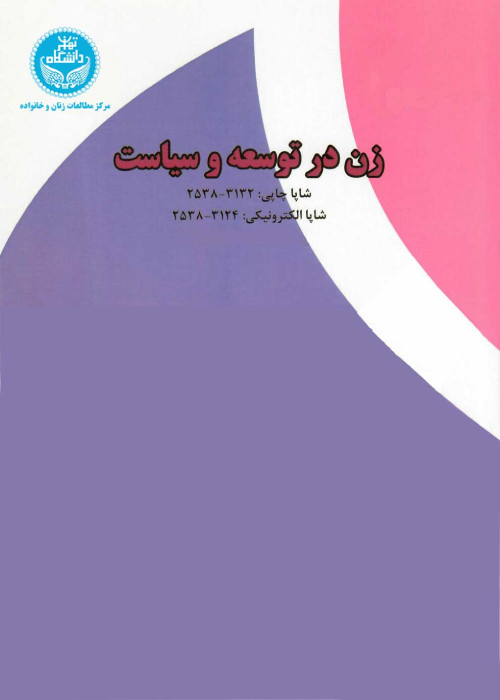Trade expansion and Women's Job Opportunities (Case study: Iranian manufacturing industries)
Author(s):
Abstract:
Globalization is a complex and complicated concept that can be defined from various dimensions including political, cultural and economical. Economically speaking, globalization is defined as a process in which the mobility of capital, organizations, ideas, discourses, and people has taken on an increasingly global or transnational form. Many economists believe that globalization is an engine of growth because it can stimulate economic development through an increase in exports; reducing the isolation of many developing countries, and facilitating their access to new technologies and information. On the other hand, other economists argue that free trade can give rise to high levels of unemployment in the affected sectors. In terms of the effects of globalization on women, the same controversy exists. Opponents of globalization accuse the new free zones of gender discrimination and exploitation of women. Moreover, spread of poverty and prostitution among women are frequently cited as byproducts of globalization. Meanwhile, proponents of globalization, explain that worldwide competition makes discrimination too expensive to sustain. Thus, it seems that Globalization is an unavoidable and accelerating process that affects the national economies in all aspects. Although in an integrated world, there is not any difference between man and woman, it seams that, women are greatly affected by world trade and globalization. Trade liberalization has had a particularly striking effect on the number of women working in developing countries’ manufacturing sectors. It seams that export-oriented industrialization is associated with a rising share of women’s manufacturing employment. Considering the fact that female make up about half of the population in Islamic Republic of Iran and play an important role in economic activities and sustainable development, it is essential to know how trade liberalization affects women’s job opportunities. Bearing in mind that legally speaking there is no difference and discrimination between men and women in terms of employment, this study investigates the effects of trade liberalization indices on women’s manufacturing employment (as an important sector in the industry development process) between the Period of 1996-2005. The research uses export, import and sum of export and import to the value added ratio in 2 digit industry level as trade liberalization indices. Panel data method is used for the purpose of the research. The results of this study show that trade liberalization has a significant negative impact on women’s manufacturing employment and also there is a positive relationship between women’s wage and ratio of Construction payments to total payments. It seems that one of the reasons of the negative relationship between trade liberalization and women’s manufacturing employment is women's low initial human capital endowments. To break the vicious circle of women's low initial human capital endowments and inferior labor market outcomes, the paper proposes greater access of girls to education and of women to training, enforceable equal pay, taxation and benefit structure that treats reproduction as an economic activity and women as equal partners within households, and a better accounting of women's work to include invisible production.
Language:
Persian
Published:
Women in Development and Politics, Volume:8 Issue: 4, 2011
Page:
159
magiran.com/p818555
دانلود و مطالعه متن این مقاله با یکی از روشهای زیر امکان پذیر است:
اشتراک شخصی
با عضویت و پرداخت آنلاین حق اشتراک یکساله به مبلغ 1,390,000ريال میتوانید 70 عنوان مطلب دانلود کنید!
اشتراک سازمانی
به کتابخانه دانشگاه یا محل کار خود پیشنهاد کنید تا اشتراک سازمانی این پایگاه را برای دسترسی نامحدود همه کاربران به متن مطالب تهیه نمایند!
توجه!
- حق عضویت دریافتی صرف حمایت از نشریات عضو و نگهداری، تکمیل و توسعه مگیران میشود.
- پرداخت حق اشتراک و دانلود مقالات اجازه بازنشر آن در سایر رسانههای چاپی و دیجیتال را به کاربر نمیدهد.
In order to view content subscription is required
Personal subscription
Subscribe magiran.com for 70 € euros via PayPal and download 70 articles during a year.
Organization subscription
Please contact us to subscribe your university or library for unlimited access!



